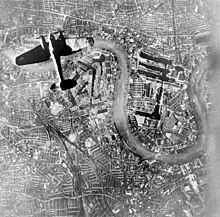| London in World War II | |||
|---|---|---|---|
| 3 September 1939 – 2 September 1945 | |||
 Heinkel He 111 bomber over the Surrey Commercial Docks on 7 September 1940 | |||
| Location | London | ||
| Monarch(s) | George VI | ||
| Prime Minister(s) | Neville Chamberlain, Winston Churchill,
Clement Attlee | ||
| Key events | Kindertransport, evacuation, The Blitz | ||
Chronology
| |||
| History of London |
|---|
| See also |
|
|
The United Kingdom took part in World War II from 3 September 1939 until 15 August 1945. At the beginning of the war in 1939, London was the largest city in the world, with 8.2 million inhabitants.[1] It was the capital not just for the United Kingdom, but for the entire British Empire. London was central to the British war effort. It was the favourite target of the Luftwaffe (German Air Force) in 1940, and in 1944-45 the target of the V-1 cruise missile, the V-2 rocket, and the unsuccessful V-3 "London gun".
An estimated 18,688 civilians in London were killed during the war,[2] 0.23% of the population.[3] 1.5 million were made homeless.[4] 3.5 million homes and 9,000,000 square feet (840,000 m2) of office space were destroyed or damaged.[5]
- ^ Ziegler 1998, p. 4.
- ^ Brooks 2011, p. 154.
- ^ Overy, Richard (16 March 2020). "The dangers of the Blitz spirit". HistoryExtra. Retrieved 2 February 2023.
- ^ Porter 1994, p. 342.
- ^ Porter 1994, p. 341-342.
